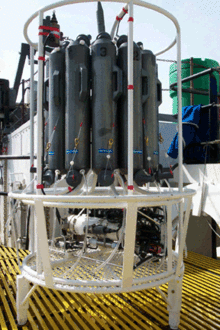
Back جودة المياه Arabic পানির গুণমান Bengali/Bangla Ansawdd dŵr CY Wasserqualität German Ποιότητα του νερού Greek Calidad del agua Spanish Vee kvaliteet ET Uraren kalitate EU کیفیت آب FA Vedenlaatu Finnish

Water quality refers to the chemical, physical, and biological characteristics of water based on the standards of its usage.[1][2] It is most frequently used by reference to a set of standards against which compliance, generally achieved through treatment of the water, can be assessed. The most common standards used to monitor and assess water quality convey the health of ecosystems, safety of human contact, extent of water pollution and condition of drinking water. Water quality has a significant impact on water supply and often determines supply options.[3]
- ^ Cordy, Gail E. (March 2001). "A Primer on Water Quality". Reston, VA: U.S. Geological Survey (USGS). FS-027-01.
- ^ Johnson, D. L.; Ambrose, S. H.; Bassett, T. J.; Bowen, M. L.; Crummey, D. E.; Isaacson, J. S.; Johnson, D. N.; Lamb, P.; Saul, M.; Winter-Nelson, A. E. (1997). "Meanings of Environmental Terms". Journal of Environmental Quality. 26 (3): 581–589. Bibcode:1997JEnvQ..26..581J. doi:10.2134/jeq1997.00472425002600030002x.
- ^ Guidelines for Drinking-water Quality: Fourth edition incorporating the first addendum (Report). Geneva: World Health Organization (WHO). 2017. hdl:10665/254637. ISBN 9789241549950.